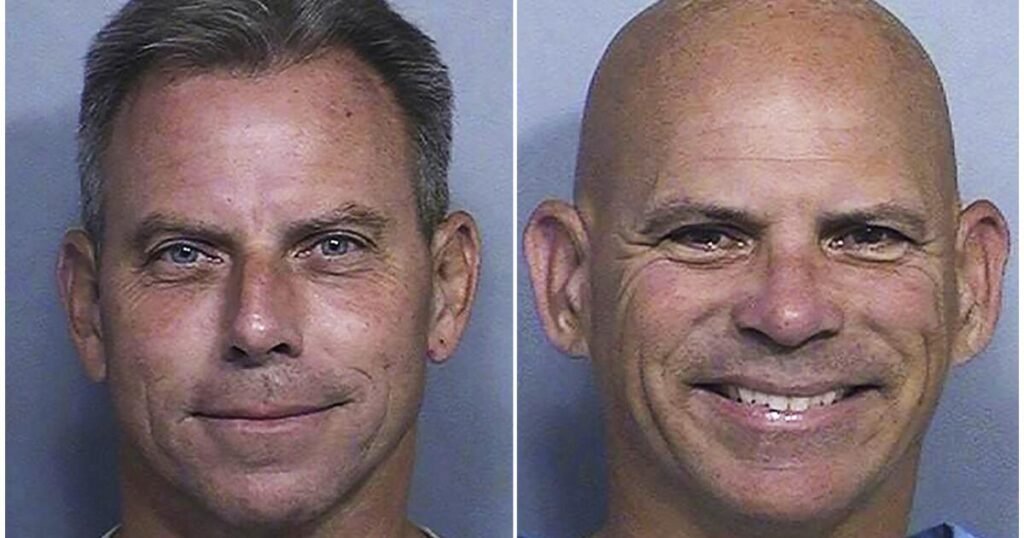Sacramento –
After Lyle Menendez’s application for parole was denied the previous day, the California parole board determined he would remain incarcerated due to his involvement in the 1989 shotgun murders of his parents.
During the hearing, which lasted about two hours, the board questioned the 57-year-old about efforts he made to deceive witnesses during his trial, and how he and his brother Eric, now 54, responded after their parents were killed. Menendez reflected on that tumultuous time. “For six months, I felt I had to lie to my grieving relatives,” he stated. “That wasn’t relief—it was suffering.”
At times, Lyle felt he was protecting Eric, but he admitted his actions didn’t help and ultimately led to ruin. “I thought I was saving my brother, but instead, I destroyed his life,” he claimed. “I saved no one.”
The hearing took a strange turn on Friday when audio from Eric’s parole hearing was released a day earlier, sparking anger among their family and lawyers, who accused the California Department of Corrections and Rehabilitation (CDCR) of leaking the material, which they believed tainted Lyle’s hearing.
A spokesperson for the CDCR acknowledged the mishap, stating that the audio was released “inappropriately” but didn’t provide further details. Menendez expressed his frustration over the situation, saying, “I felt misled by the release of this information.”
His lawyer, Heidi Rammell, was outraged as well, labeling the hearing a “spectacle.” “I can’t truly understand what this family is feeling,” she noted, emphasizing their desire for privacy.
After the audio leak, a family member who had intended to testify decided against it, and there were attempts to seal the transcripts of the hearing. Board member Julie Garland pointed out that under California law, such audio can be public, while transcripts typically become accessible within 30 days.
During his initial appeal, Lyle faced inquiries about his credibility. Garland criticized him for attempting to manipulate witnesses and for the dishonesty that characterized his previous actions. Menendez defended himself by saying he was unaware of any plans at that time, but admitted certain issues caused him stress.
When challenged about his credibility, Garland asked, “Even if you were deceiving your family, don’t you think that means you are adept at lying?” Menendez suggested that the regret he felt led to a deeper understanding of his past beliefs that had nothing to do with murder.
A former prosecutor underscored that the board’s decision to deny parole aligns with their historical stance against releasing inmates convicted of violent crimes. “The board shows they are committed to keeping violent offenders behind bars,” he stated.
The brothers received life sentences for murdering their parents, Jose and Kitty Menendez, but were granted hearings after qualifying for review. Despite their family’s support, the severity of their crimes has historically fueled opposition to their release.
The murders involved the brothers acquiring a shotgun illegally and killing their parents in their own home, which authorities described as reminiscent of a gangland execution. Jose was shot five times in the back of the head while Kitty was shot in a brutal final act. The brothers called 911 shortly afterward. Prosecutors highlighted that after the murders, they bought luxury items, suggesting a motive linked to financial gain from their inheritance.
Defense arguments during the trial focused on years of alleged abuse at the hands of their father. The hearings, unlike the chaotic trial, proceeded relatively calmly. A journalist was permitted to view the hearing via a projector at the CDCR’s headquarters.
During the proceedings, Lyle did struggle with discussing how his father abused him, admitting that it caused him shame. He described feeling constant vigilance around that trauma. “It took me a long time to realize it ended,” he mentioned, alluding to lingering fears from his past.
He also claimed to have taken care of Eric while growing up, often feeling responsible for his brother’s well-being. While testifying, Lyle acknowledged that he hadn’t previously recognized certain experiences with his mother as abuse, saying it was only now that he understood it as such.
When asked why they hadn’t mentioned possible disinheritance to the board, Lyle stressed that the inheritance was not a motive for the tragic acts. Instead, he worried about financial instability post their parents’ deaths.
In light of Eric’s denial of parole, he cannot reapply for another three years. Lyle’s stepdaughter expressed dismay over the decision, voicing the emotional toll on their family.
Though family members expressed disappointment, they remained cautiously optimistic about Lyle’s hearing. Supporters point to various rehabilitation programs Lyle has participated in during his incarceration, including anger management and hospice care.
However, the board highlighted violations such as unauthorized cell phone usage, which further complicated Lyle’s case. He admitted to using a cell phone to keep in touch with family, leading to questions about the legitimacy of his actions.
Despite these violations, Rammell argued Lyle’s time in prison hasn’t involved violence. “This board claims you’re dangerous because of phone use,” she stated, insisting there is no evidence linking him to violent crimes.
The board appeared to fixate on credibility, with some members suggesting that Lyle seemed to have “two different personalities.” They expressed doubt about the usage of his phone and whether he had manipulated his presence on the advisory committee to gain advantages.
Throughout the hearing, Lyle defended his character, maintaining he was trying to do good in prison and aspiring to be better. “I want to be more than defined by violence,” he concluded.







